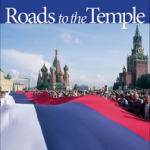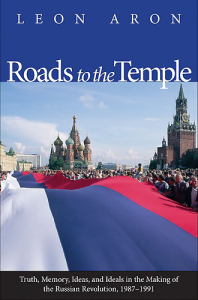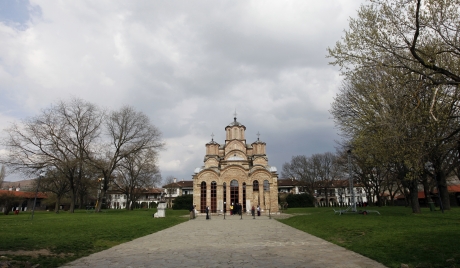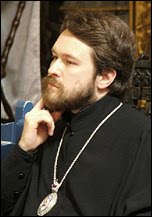
Deprecated: trim(): Passing null to parameter #1 ($string) of type string is deprecated in /home/aoiusa/public_html/wp-content/plugins/sexybookmarks/public.php on line 388
Deprecated: trim(): Passing null to parameter #1 ($string) of type string is deprecated in /home/aoiusa/public_html/wp-content/plugins/sexybookmarks/public.php on line 394
Deprecated: trim(): Passing null to parameter #1 ($string) of type string is deprecated in /home/aoiusa/public_html/wp-content/plugins/sexybookmarks/public.php on line 400
Belows is the review I wrote of Leon Aron’s new book Roads to the Temple: Truth, Memory, Ideas, and Ideals in the Making of the Russian Revolution, 1987-1991. It is a great read and I recommend it highly. It chronicles Glasnost, the period of awakening in Russia from around 1987-1991 that, Aron argues, was a moral awakening, indeed a repentance, of the first order that enabled the Russians to throw of the spiritual shackles of Communism.
Nothing is more powerful than a word spoken in truth, wrote Alexander Solzhenitsyn, arguably one of the most influential moralists of the last century. Glasnost was the period where speaking the truths that got you killed just a year or two earlier resounded ever more loudly in the public square. Lest we complacent Westerners take this development for granted, let’s remember that we have largely left off believing that truth even has an objective character. We are very close to the (philosophical) materialist assumptions that justified such great brutality and suffering in Russia and which Glasnost finally overthrew.
The review was published by the Acton Institute.

Source: Acton Institute | By Rev. Johannes L. Jacobse
 Roads to the Temple: Truth, Memory, Ideas, and Ideals in the Making of the Russian Revolution, 1987-1991. By Leon Aron (Yale University Press, June 2012). 496 pages
Roads to the Temple: Truth, Memory, Ideas, and Ideals in the Making of the Russian Revolution, 1987-1991. By Leon Aron (Yale University Press, June 2012). 496 pages
“There are different ways to understand how revolutions work,” writes Leon Aron in his new book Roads to the Temple: Truth, Memory, Ideas, and the Ideals in the Making of the Russian Revolution, 1987-1991 that chronicles the collapse of Soviet Communism during Glasnost from 1987-1991. The most dominant is structuralism, an approach that draws from Marxist thought and sees the state as the central actor in social revolutions. In the structuralist view revolutions are not made, they happen.
Aron explains that structuralism has some merit because of its chronological linearity. It can reveal the events that lead from point A to B to C; an important function because the historian’s first step is to grasp what actually happened. But structuralism also has a grave flaw: the materialist assumptions (“objective factors”) informing it are deaf to the “enormously subversive influence of ideas.”
Structuralism, specifically, is subservient to Marxist dogma, particularly the relegation of the ideas into the category of idealism (non-being). It defines man as a passive actor in the fixed and impersonal currents that drive history that renders the historian blind to man’s moral character, particularly constituents such as “truth, memory, ideas, and ideals” that shape purpose and meaning and by them drive events.
Glasnost was a social revolution of the first order driven by these moral constituents, Aron writes. It arose not by the will of the Soviet state but because the state was already weakened. Aron quotes Tocqueville who first described how weakened states till the soil that leads to their dissolution:
It is not always that when things go from bad to worse that revolutions break out. On the contrary, it oftener happens that when a people … suddenly finds the government relaxing its pressures …Thus the most perilous moment for a bad government is one when it seems to mend its ways … Patiently endured for so long as it seemed beyond redress, a grievance appears to become so intolerable once the possibility of removing it crosses men’s minds.
Glasnost arose out of Perestroika, the effort to revive the moribund Russian economy by introducing market-based reforms and foster an increasing openness to the West. Internal progress was stymied by the moral rot that pervaded all levels of Russian society (alcoholism, cronyism, abortion, waste, fraud, despair, censorship, food shortages, murders, exiles). Perestroika could not succeed until the rot was first confronted.
Dry Tinder
Although Glasnost officially began in 1987, an event one year earlier lit the fuse. Unlike earlier Soviet rulers, Mikhail Gorbachev had a visceral dislike of the brutal terror that forced the compliance of Russian subjects to centralized economic planning. He choose instead to relax the restraints of the state on its subjects. After heated debate in the Politburo, the anti-Stalinist film Pokoyanie or Repentance was released and the floodgates opened. Russians were about to breathe the air denied them since Lenin first seized power.
Glasnost quickly took the shape of a national repentance in the full sense of that term. Censorship disappeared, not by state decree (the leadership had originally hoped to limit debate) but because millions of Russians sensed the shackles being broken and joined in to expunge the lies that held the terror state in place.
The discussions took place in journals and newspapers, on television, in homes and marketplaces. A flood of written material was produced, much of which Aron studied to shape his historical narrative, selecting that which that illustrated with great clarity the radical nature of this second revolution.
The recovery of the past is laborious and often painful because the loss of historical memory creates the loss of individual identity. The New Man of the Collective, that febrile illusion of materialists everywhere – be it Jacobin, Soviet, Nazi or any other incarnation – was the first lie that needed to be named and repudiated.
The loss of historical memory created what Aron calls the “deafened zone,” a place in the national consciousness that contained no memories, that was enforced by an exhaustive policy of censorship that not only concealed facts but by the “hourly construction and maintenance of a ‘parallel,’ ‘brilliant’” reality created a history that never existed. Orwell’s 1984, Huxley’s Brave New World, and Grossman’s Life and Fatewere published for the first time during Glasnost and did much to define what the “deafened zone” actually was.
One develops moral self-awareness first by hearing truth and then seeing and acting on it. Once the “brilliant” history was revealed as the continuous cascade of lies that it was, the voices of those muted by the cacophony of the state-controlled media began to be heard, faintly at first but louder as more witnesses stepped forward. First up were those who recalled seeing friends and relatives of the millions murdered by the barbarous regime.
It is difficult to grasp the scope of Soviet brutality. The best we can do is examine the individual stories and multiply them again and again until the limits of imagination are reached. The suffering is too great for any one person to perceive although people who value truth will see that the ideas driving the regime were conceived in the fetid bowels of hell. Nothing else explains such abject depravity.
Myths Shattered
This was only the beginning. “Any lasting polity espouses and propagates essential beliefs by which it lives,” writes Aron, and the Soviet Union “spawned a powerful mythology that legitimized political, economic, and social arrangements.” Sustained daily by constant propaganda and censorship and the restriction on travel except for the elites, it imposed severe penalties on any new version of the Soviet past and present. Yet, between 1987 and 1989, “virtually every constituent myth of this tale was shattered by uncensored truths.”
Legitimizing myths were becoming “unraveled” — a very dangerous development for the leadership because delegitimizing of the regime was a direct challenge to its power. Aron chronicles in considerable detail the unraveling that, in historical terms, happened in the blink of an eye. Here too Russian intellectuals began to weigh in. Economists pored over the “official” economic reports and pointed out they were riddled with lies; military analysts revealed the war in Afghanistan was a defeat (Russians believed they won) and unearthed the truth behind the Great Patriotic War, particularly Stalin’s enthrallment with Hitler and the millions fed as fodder to the Nazi war machine because of his inept leadership.
Aron describes too the damage that forced collectivization imposes on the soul. Glasnost enabled the Russian to see that Homo Sovieticus was both a “symbol of a spiritual crisis and its epitome.” The Soviet Man forgot how to work, was driven by envy, sloth, lying, and stealing, driven to drink, both humiliated and humiliator. The virtue necessary for stability and progress was methodically and mercilessly ground out of almost everyone. Despair left the soul and the nation bare.
Moral crises are healed by repentance. In Greek, repentance (metanoia) means “a turning or change of the mind;” literally a new way of seeing. Although Aron does not mention it, the call to repentance was made years earlier. In 1975 From Under the Rubble, a book by Alexander Solzhenitsyn and six other dissidents (all living in Russia at the time) was published that outlined with uncanny accuracy the steps necessary for the Russian restoration.
Glasnost, like every modern revolution, “was about reclaiming and extending human dignity … ” At first it imposed on the Russian leadership a new definition of socialism (Gorbachev sought to meld the new found freedom with socialist ideas) and foreign affairs. As time went on however, it became increasingly clear that the great collectivist experiment needed to be scrapped altogether. New ideas emerged that proclaimed that the quality of domestic and foreign policy were indissolubly dependent on the moral health of the citizenry. Universal values were to be recovered and implemented. A new democracy had to be crafted that was “based on deep-rooted morality and conscience.”
Aron’s masterful work may also contain a prophetic warning. Russia repudiated the materialist ideas that eroded the barriers against the tyranny while the nations of the West are embracing them. If Russia’s history proves moral renewal breaks the shackles of darkness, then our moral corruption may be blinding us to an enslavement coming our way.



